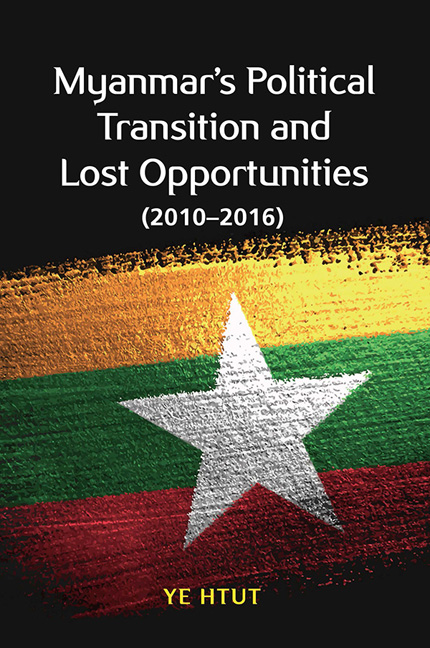Book contents
- Frontmatter
- Contents
- Foreword
- Acknowledgements
- Introduction: Myanmar's Political Reforms
- 1 The National Convention
- 2 The Constitution
- 3 The Union Solidarity and Development Party
- 4 Myanmar Spring and Aung San Suu Kyi
- 5 The Union Government
- 6 The Government and the Parliament
- 7 Shwe Mann's Checkmates
- 8 Turning Points
- 9 Media Reform
- Epilogue
- Appendix A President Thein Sein's Inaugural Address
- Appendix B President Thein Sein's First Address to the Cabinet
- List of Interviewees
- Index
- About the Author
- Plate section
- Frontmatter
- Contents
- Foreword
- Acknowledgements
- Introduction: Myanmar's Political Reforms
- 1 The National Convention
- 2 The Constitution
- 3 The Union Solidarity and Development Party
- 4 Myanmar Spring and Aung San Suu Kyi
- 5 The Union Government
- 6 The Government and the Parliament
- 7 Shwe Mann's Checkmates
- 8 Turning Points
- 9 Media Reform
- Epilogue
- Appendix A President Thein Sein's Inaugural Address
- Appendix B President Thein Sein's First Address to the Cabinet
- List of Interviewees
- Index
- About the Author
- Plate section
Summary
The greatest impact on the Myanmar Spring was the rivalry between President Thein Sein and the Speaker of the lower house Shwe Mann. On the surface this was seen as a rivalry between the executive and the legislative branches. In reality it was a consequence of Shwe Mann's attempt to control the USDP and to sideline the president. Shwe Mann believed that Thein Sein was of lesser ability than himself and that he had been denied his rightful position of the presidency by Senior General Than Shwe. From the first day, he sought to use the parliament as a tool to impose his policies on the government.1 Six major incidents took place between 2011 and 2016 in which Shwe Mann tried to weaken the president and undermine his power.
2012–13 Budget
The first incident was the 2012–13 budget. On 7 February 2012, Shwe Mann delivered a speech as the Speaker of the Pyithu Hluttaw (lower house or people's assembly) at a rare meeting of the Pyidaungsu Hluttaw (Union assembly). Unusually, instead of speaking from his seat like other representatives, he mounted the rostrum from which he addressed the joint assembly. Rather astonishingly, Shwe Mann failed to consult with the president or the cabinet in advance of this address, which mainly concerned the government's economic policy.
The immediate issues Shwe Mann dealt with in detail were the raising of the salaries of civil servants and the suspension of development projects2 carried over from the previous military government. He announced three issues that the Union Parliament should demand the government to comply with. Of these, the following two had an immediate impact on the government.
The government should increase civil servants’ salaries in the coming 2012–13 budget.
The Pyidaungsu Hluttaw should thoroughly scrutinize government development projects and suspend or reject those thought to be unnecessary.
Shwe Mann urged the Pyidaungsu Hluttaw members to consider a resolution based on his suggestions. That was Shwe Mann's political trick. If he had made this proposal in the Pyithu Hluttaw, the resolution would have been nonbinding. However, if the Pyidaungsu Hluttaw adopted such a resolution, the government was bound to implement it and to duly report back to the Hluttaw.
- Type
- Chapter
- Information
- Publisher: ISEAS–Yusof Ishak InstitutePrint publication year: 2019

